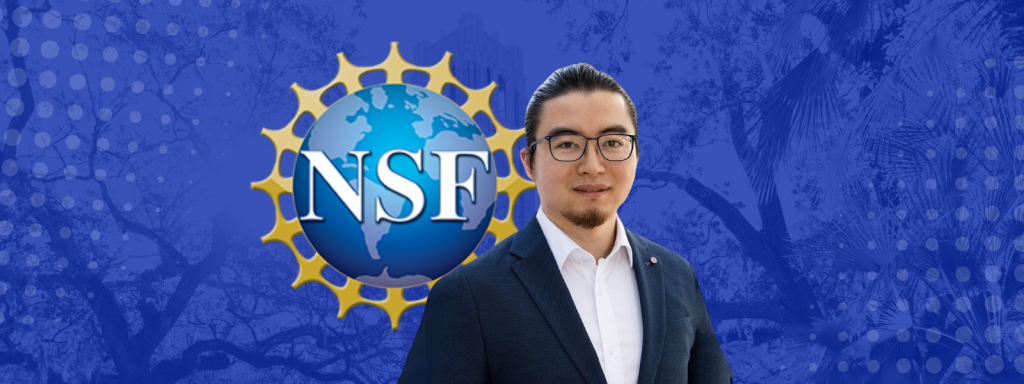
Dr. Jing Pan, a UF MAE professor, won a CAREER Award from the National Science Foundation last month. This honor is the most prestigious award granted by the NSF, and comes with a federal research grant.
Pan’s winning proposal was about developing a biosensing technology for monitoring chemicals and biomolecules in bodily fluids, such as blood, sweat, or saliva. This technology will help patients with compromised immune systems, which cause a substantial number of deaths every year and are one of the costliest conditions to diagnose and manage. It will also allow medical professionals to make better clinical decisions with more information about the disease trajectory of patients.
Currently, most medical diagnostic tests only give a single point measurement, and getting the result usually takes hours, or even days. This is inadequate for patients who are unstable and who suffer from severe injuries or systemic immune malfunctions. In situations like intensive care units and emergency care, for example, patients’ conditions can change more quickly than they can be measured. This issue was especially prevalent during the COVID-19 pandemic, during which many patients died due to a rapid deterioration of organ functions that was difficult for doctors to track.
“However, if we rush to interfere with the immune system blindly, we risk breaking the delicate balance in patients’ bodies even faster, as disease trajectories and medical conditions differ from person to person,” Pan said. “We really need a technology that can help us see the hidden dynamics in patients’ bodies to enable adaptive and personalized medical interventions.”
Pan explained that the main goal of his project is to develop sensors that can continuously monitor molecular indicators of immune status in the body.
“Similar to how, to use thermostats to control indoor environments, we first need to have sensors to measure the current temperature and humidity, if we want to better treat and control immune response to disease, we need to know its current status and past trajectory,” he said. “This is difficult because immune effector molecules are usually in small quantities in our body, and it takes a long time to accurately measure low-abundance analytes in complex body fluids.”
Pan and his Biodesign Lab work to develop cutting-edge biotechnology and medical technology with the purpose of addressing challenges in fields such as healthcare, the environment, and agriculture. Their technological focus is often on molecular devices and nanoscale tools, such as the nanoparticles they’re creating for the NSF project that will serve as miniature sensors to continuously monitor the states of biological systems.
His team proposed a mechanism to combine nanomaterials, nanostructured surfaces, and novel biorecognition elements to achieve accurate and rapid measurement. They plan to develop a prototype device that can be used for continuous immune modulator monitoring at the point of care. That technology would be broadly applicable to the measurement of biomarkers across many different physiological processes.
For example, they also plan to advance engineering education (which is an aspect of the CAREER Award) by using the technology they develop to better understand the anxiety students experience during exams.
“There are many theories and experimental studies to understand the cause and the consequences of test anxiety in engineering education, but most methods use self-reported survey instruments to measure stress and anxiety,” Pan said. “We, in collaboration with Dr. Idalis Villanueva Alarcón from the UF Department of Engineering Education, propose to use biosensors to monitor the physiological component of anxiety, such as stress biomarkers in saliva, which is more objective and reflects real-time stress behaviors in students.”
He also said that he intends to use this project as an opportunity to collaborate with physicians and clinical scientists in order to address clinical challenges and improve patient outcomes. “I’m excited,” he said. “With the support from the NSF, now we can finally start developing the technology and benchmarking it with the current state of the art.”
